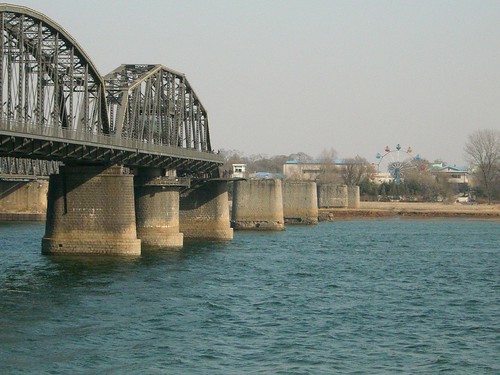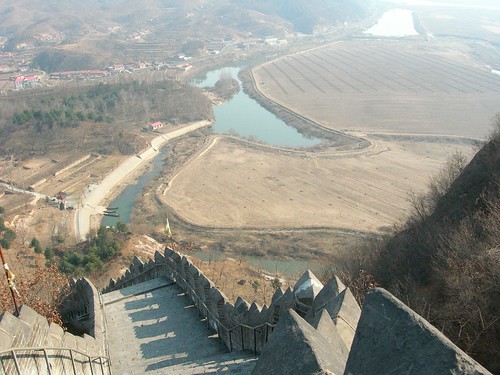The photographer
-你在照朝鲜的相还是鸟的相?
-鸟儿啊!
I spent my first afternoon walking along the Yalu riverfront, taking obligatory pictures of the "Broken Bridge" that ends mid-river up to the point where North Korea disassembled it, and the infamous North Korean ferry wheel that never has any riders, when I saw a group of Chinese people with nice cameras and long zoom lenses. They were pointed vaguely in the direction of North Korea. I was excited by their apparent interest in what lay on the other side of the border. But then I realized with dismay that what I had on my hands might in fact be a group of aspiring wildlife photographers. I asked one old man if he was taking pictures of North Korea or of the birds. "The birds!" he answered, as if it was obvious. How ironic, I thought, that commonplace seagulls would attract so many Chinese people (tourists? locals? It wasn't clear.) when the world's most isolated country is just on the other side of the river. But then I continued to ponder, watching the photographers at work. The birds were full of life, swooping, flapping, glistening white in the sunlight. The land on the other side of the water was quiet and still, eerily so. The ferry wheel hadn't moved for who knows how many years? With keen eyes and much patience, I could make out a few small, dark figures on the opposite shore: one walking over a bridge, another next to a boat that looked permanently beached. But even they failed to hold my interest. Meanwhile, the seagulls were glorious in their flight.


The Farmer
-每天在长城旁边劳动有什么感觉?
-没有什么...很平常
The highlight of my Dandong trip was going to Tiger Mountain Great Wall. It's the easternmost section of the Great Wall, not very long, and not as popular as the wall sections that are near Beijing and further inland. Perfect for a morning trip. And I had it all to myself. "You're our first tourist today," said an amazed security guard when I reached the far end of the section around 9 am. Other than than two sanitation crew members, the only other person I saw for several hours was a farmer working his hoe at the foot of the wall. In front of him towered one of the wonders of China and of the world; to his back, a short distance's walk and narrow river crossing away, lay the North Korean countryside--one of the unfortunate mysteries of the world. I stopped and spied on him for a bit from a cut-out in the wall, and finally called out, "Hello!" He looked up. "How do you feel about working next to the Great Wall everyday?" I didn't catch the first couple of words of his reply, but what I did catch was "Not really anything! It's normal!" I didn't ask about North Korea.


To the right, North Korea, to the left, China. Notice how narrow the river gets just left of center.
The Soldier
-界线有多少军人?
-这我不能告诉你.
-秘密?
-Yes.
When I got to the end of the wall, I decided to walk along the bend of the Yalu River, scanning the other side for any traces of the tiny figures I seen from the highest rampart: a man pacing in a field, three people sitting near a pond with what looked like a fishing rod. The fields were quiet, though. I only saw some Chinese people picking trash on our side of the river. The barbed wire didn't seem to bother them. I walked until I reached the section of the river that I had wanted to see: 一步跨 (Yibukua, One Step Across). It is a very narrow section of the river that could be crossed in literally one step, if not for the mounted Chinese security camera and a lone soldier with his digital video camera. The soldier was from Henan, and spoke Mandarin with an accent that I was unaccustomed to. He looked very young in his camouflage uniform. He didn't like the fact that I was venturing close to the trickling water, but he was friendly. He explained that it was a buffer zone, and therefore off limits. "Don't worry, I'm not going to North Korea," I laughed. He smiled and clutched his camera. I asked him what it was for. He answered that it was for visual evidence, in case someone tried to cross. Did a lot of people cross? Of course some people tried to cross, but China had to send them back. I told him that in the West, we wanted North Korea to liberalize and open up. China wanted the same thing, he replied. We talked in Chinese, but after finding out I was American, he tossed an English "Yes!" in whenever he could. "How many soldiers are there on the border?" I inquired. "That I can't tell you." "Secret?" "Yes!" I smiled and retreated, leaving him with his camera and hazy view of the brown fields ahead of us.


The Roadside Merchant
-是朝鲜的鸡蛋
-跟中国鸡蛋不一样吗?
-是啊,朝鲜的鸡蛋有比较多营养因为他们的鸡只吃虫子。
Having "done" the Wall in less time than expected, I wandered back over to the intersection where the bus from Dandong had dropped me off. I just narrowly missed the 10 am bus, so I loitered for an hour, checking out the tomatoes and goose eggs at the roadside farmers market, where women had set up their 3-wheeled bikes, which double as produce stands. Across the road another woman was selling the kinds of knickknacks found in the ubiquitous "North Korean Specialty Goods" stores in Dandong, but which could easily have been and most likely were produced in China - fancy nail clipper/scissor sets, decorations and baubles, and other "Korean" kitsch. She also had small statuettes of Mao and of the Buddha, what looked like giant prehistoric pine cones, and a crate of eggs. The eggs caught my attention because they were simply yet elegantly sustainably packaged. How wonderful that Chinese farmers are doing this! I thought to myself. If only eggs were sold like this in the U.S.! Some other people sauntered up to take a look, at which point the saleswoman said, "These eggs are from North Korea." "Are they different from Chinese eggs?" a man asked. "Yeah, they're more nutritious, because over there the chickens only eat insects." My only contribution to the conversation was, "It seems odd that they are exporting their eggs when they should be eating them." "Yes, they are poor," one of the Chinese people acknowledged. Not much else was to be said.

I have now seen North Korea from both the north and south sides. What a contrast! The Demilitarized Zone, which I toured while in South Korea, was so heavily guarded, while the Dandong border seemed casual in comparison. Of course, appearances are deceiving.
these egg casings are beautiful! As is the photo from you peeking through the wall....this entry was fascinating! <3
ReplyDelete